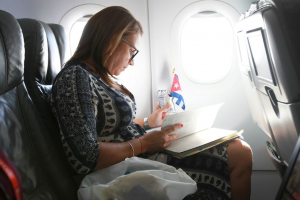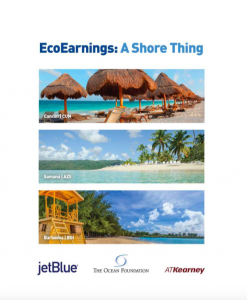CUBA STANDARD — JetBlue partnered with the New York Botanical Garden and other organizations to launch a consortium focusing on environmental conservation and commerce in the Caribbean.
The consortium announced it wil start with a program on Cuba, building on research about threatened plants under a “Cuba initiative” by the New York Botanical Garden.
In partnership with Cuba’s Instituto de Ecología y Sistemática, Jardín Botánico de Las Tunas, and Centro Oriental de Ecosistemas y Biodiversidad, NYBG and Cuban scientists over the past decade have been charting Cuba’s most vulnerable plants, collecting more than 45,000 plant and fungal specimens from the island.

“During Year One, this group will make recommendations on development and environmental issues, to help ensure that Cuba’s natural habitat is protected for future generations,” JetBlue said in a press release. The consortium will focus on “capacity-building, influencing public policy, knowledge-sharing and increasing access to resources,” the company said.
“Conserving the natural resources of Cuba, one of the most ecologically diverse islands, is important to maintaining its unique ecosystem,” said Sophia Mendelsohn, JetBlue’s head of sustainability. “JetBlue wants to protect the region’s natural beauty, which in turn protects progress and our business. This is particularly relevant as development in Cuba continues to grow.”
JetBlue in 2014 teamed up with the Ocean Foundation to publish a report about the connection between ecosystems and revenue, defining large-scale environmental degradation in the Caribbean as a risk to demand for air travel to the area.
With one-third of its network in Latin America and the Caribbean, the New York-based airline is growing its Caribbean routes; in 2016, JetBlue began scheduled flights to Cuba, offering close to 50 flights per week to Cuban destinations.
Marketing in the practically commercial- and ad-free environment of state-controlled media in Cuba is challenging. A recent report by British advertising giant WPP about the Cuban market recommends different brand-building strategies.
“There are so few multinational brands with an approved presence and proper distribution network in Cuba that to be one of the few permitted foreign brands brings with it a huge opportunity to stand out in consumers’ minds,” the WPP report says. “In Cuba, unlike other global media markets, public relations and corporate social responsibility are the places to start, not finish, a brand communication’s strategy. By doing good work that goes beyond selling products, in ways that match the government’s aspirations for its people, brands can open doors.”

Caterpillar Corp. was among the first U.S. corporations to pioneer do-good brand building in Cuba, by funding and supplying tools to the renovation of Finca Vigia, the home of Nobel-prize winning novelist Ernest Hemingway in Cuba for many years.

